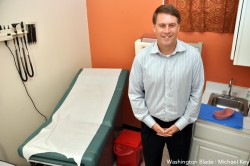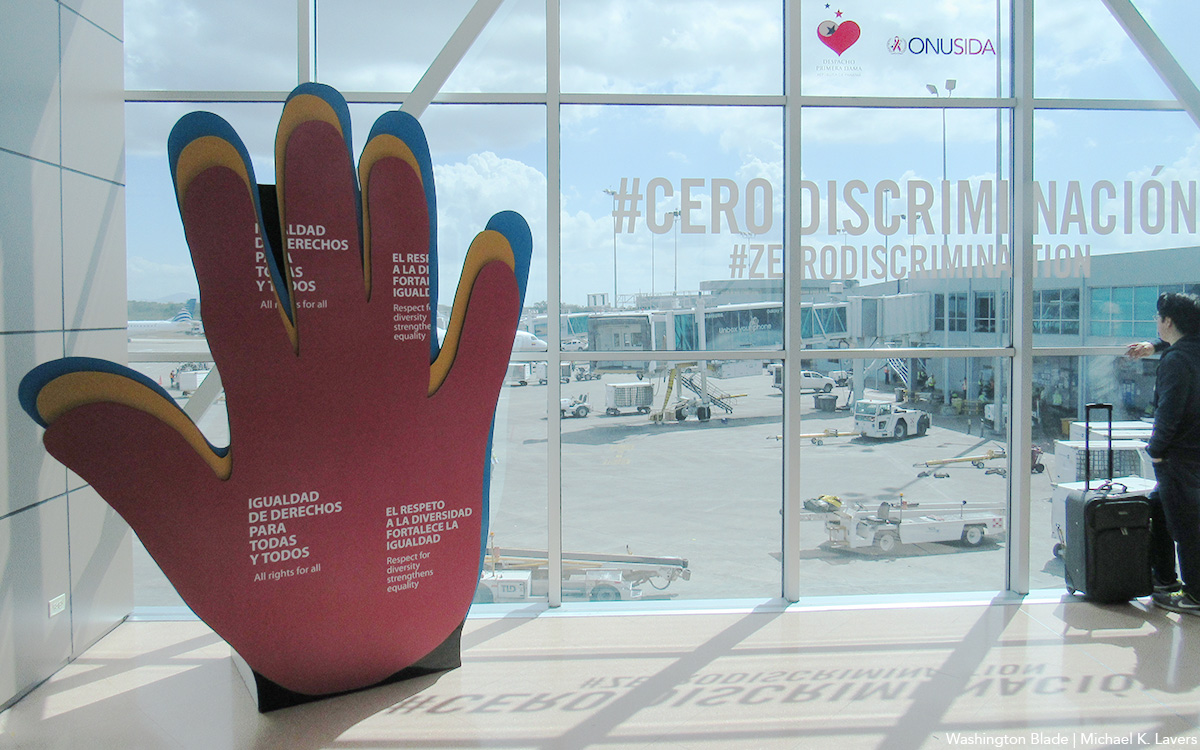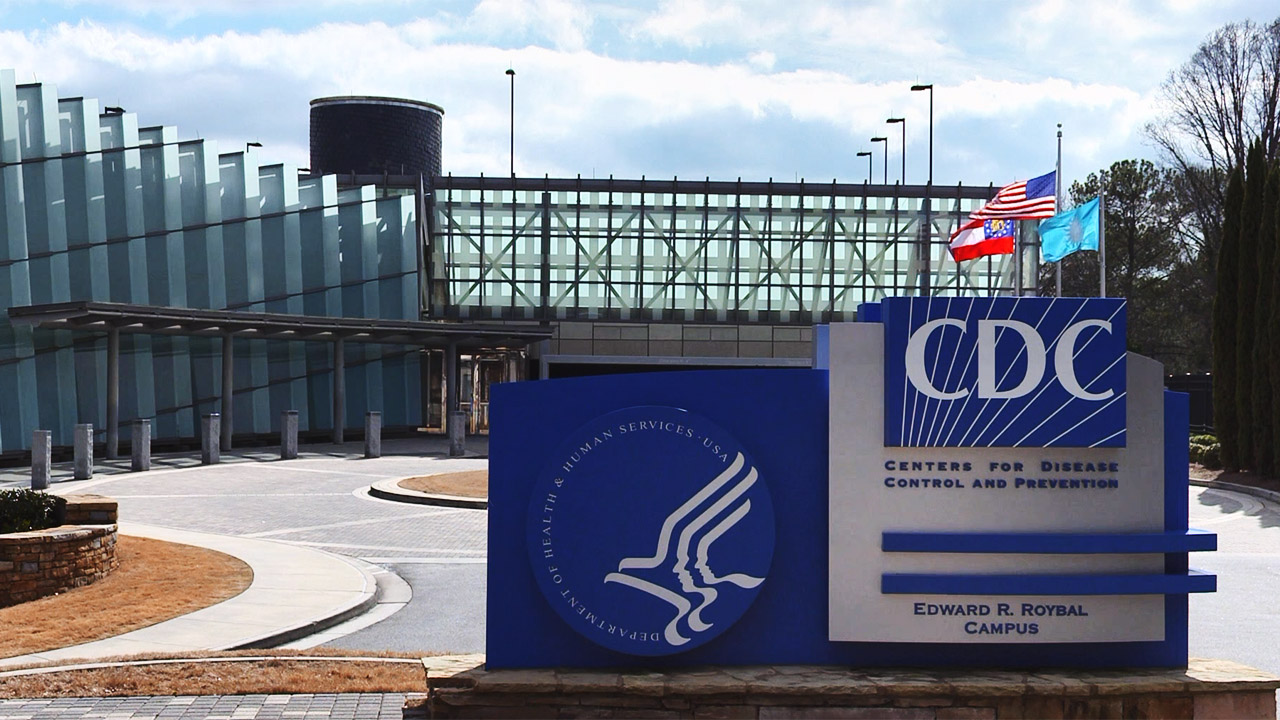Health
Ryan White funding delays ‘resolved’ for AIDS groups
Baltimore reduced client services; Whitman-Walker ‘weathered’ crisis


‘We got hit pretty hard,’ said Don Blanchon, of Whitman-Walker Health. (Washington Blade file photo by Michael Key)
A delay in the disbursement of federal Ryan White AIDS funds earlier this year that forced some community-based groups to reduce their services to people with HIV and AIDS appears to be resolved, according to officials with Baltimore and D.C. groups hit hard by the funding delays.
Tom Bonderenko, executive director of Moveable Feast, a group that provides meals for homebound people with HIV/AIDS in the Baltimore area, said his group hopes to resume full services to about 370 of its 1,200 clients that faced meal delivery cutbacks due to the funding delays.
“On this past Friday we did receive a reimbursement from the Baltimore City Health Department for some of our outstanding reimbursable funds,” he said on Wednesday. “Although we are still in a decrease service scenario for our clients, that will be adjusted in the next few weeks.”
Moveable Feast was among hundreds of community-based AIDS service organizations throughout the country adversely affected by federal AIDS funding delays initially caused by Congress taking far longer than usual to approve the federal budget for fiscal year 2011.
The city health departments in D.C. and Baltimore, which normally receive the Ryan White AIDS funds and pass them on to the community groups, reduced their previously approved grants to these groups earlier this year when they could not determine when the federal funds would be disbursed.
D.C.’s Whitman-Walker Health and the D.C. group Metro Teen AIDS were among the groups encountering problems from the funding delays.
According to officials with AIDS organizations affected by the delays, including Whitman-Walker Health, a miscalculation in Ryan White funding allocations for various cities and states by the federal agency that disburses federal AIDS funds created further delays.
The U.S. Department of Health and Human Services’ Health Resources and Service Administration (HRSA) acknowledged last month that the delays could adversely impact as many as 500,000 people with HIV and AIDS throughout the country.
HRSA spokesperson Marty Cramer told the Blade Wednesday the funding calculation problem has been resolved and HRSA is now forwarding the federal funds to cities and states, including D.C. and Baltimore.
“The situation is resolved,” he said. “The funding is out.”
Bonderenko said the funding delays forced his organization to reduce the number of meals it provides to its clients.
Last week, he said he was hopeful but uncertain that HRSA would soon disburse the funds to the Baltimore City Department of Health, which, in turn, would reimburse Moveable Feast for services it has provided to AIDS patients under a city contract.
“Basically, we are out of money,” Bonderenko told the Blade last week. “We won’t be able to assist 370 clients who depend on our service for their meals.”
Don Blanchon, executive director of Whitman-Walker Health, said his organization has also faced delays in receiving Ryan White funds for various HIV-related services it provides for low-income HIV/AIDS patients.
Blanchon said internal structural changes that Whitman-Walker made several years ago have enabled it to receive reimbursement for its services from patients eligible for Medicaid and for private health insurance coverage.
“We got hit pretty hard,” said Blanchon, who noted that the D.C. Health Department’s AIDS administration reduced its grants to community-based AIDS organizations due to the congressional budget delays and HRSA problems.
But he said Whitman-Walker now has a “diversified funding stream” that allowed it to use income from other sources to “weather this” without having to cut any of its programs or services to its clients.
Other organizations don’t have those other funding streams and they may be forced to cut back on services to their clients, Blanchon said.
Craig Shniderman, executive director of D.C.’s Food and Friends, a much larger group than Moveable Feast that provides meals for people with HIV and other serious illnesses in the D.C. area, said that similar to Whitman-Walker, his group was able to absorb the funding delays and continue its services without interruption.
“During the first half of the Ryan White grant period (March-August 2011) we experienced a very slight delay in receipt of our D.C. and Maryland Ryan White Funds,” Shniderman said. “However, this did not impact our ability to provide services insomuch as other funds available to us permitted Food and Friends to avoid any disruption in care,” he said.
Bonderenko and Blanchon said HRSA officials told leaders of AIDS groups like theirs in a telephone conference call in August that it expected to disburse all of the delayed funds in September. They said that during the same call, the HRSA officials acknowledged making a miscalculation in the allocation of Ryan White funds to states and cities, requiring them to take more time to recalculate the figures.
Bonderenko said Moveable Feast struggled to use its own money to continue its programs while waiting for the federal funds to arrive.
“We basically have carried the federal government for three months,” he said. “There are hundreds of providers in this same position.”
Health
UNAIDS to commemorate Zero Discrimination Day’s 10th anniversary
UN agency urges global action to protect human rights

As the world marks the 10th anniversary of Zero Discrimination Day; UNAIDS is sounding the alarm on the increasing threats to human rights, calling for renewed efforts to protect the rights of all individuals as a fundamental step towards ensuring health for everyone.
Established by UNAIDS a decade ago, Zero Discrimination Day aims to promote equality and fairness regardless of gender, age, sexuality, ethnicity or HIV status. The progress achieved over the past years is now in jeopardy, however, due to rising attacks on the rights of women, LGBTQ people and other marginalized communities.
UNAIDS Executive Director Winnie Byanyima emphasized the critical link between protecting human rights and safeguarding public health.
“The attacks on rights are a threat to freedom and democracy and are harmful to health,” she said in a press release. “Stigma and discrimination obstruct HIV prevention, testing, treatment and care and hold back progress towards ending AIDS by 2030. It is only by protecting everyone’s rights that we can protect everyone’s health.”
Despite challenges, there has been notable progress.
At the onset of the AIDS pandemic more than 40 years ago, two-thirds of countries criminalized consensual same-sex sexual relations. They are now decriminalized in two-thirds of countries. An additional 38 countries around the world have pledged to end HIV-related stigma and discrimination, contributing to positive changes that include 50 million more girls attending school compared to 2015.
To sustain and enhance these advancements; UNAIDS urges global support for women’s rights movements, LGBTQ rights, racial justice, economic justice, climate justice and peace initiatives. By standing with communities advocating for their rights, the U.N. aims to reinforce the collective effort towards a more inclusive and equitable world.
Zero Discrimination Day is observed on March 1.
Events and activities that will take place around the world throughout the month will serve as reminders of the essential lesson and call to action: Protecting everyone’s health is synonymous with protecting everyone’s rights.
“Through upholding rights for all, we will be able to achieve the Sustainable Development Goals and secure a safer, fairer, kinder and happier world — for everyone,” said Byanyima.
Health
New CDC report finds transgender women at higher risk for HIV
More than 1,600 people in seven cities surveyed

The Centers for Disease Control and Prevention issued a new study report this week that revealed that restricted by employment and housing discrimination and lack of access to needed gender-affirming healthcare for transgender women increasing the risk of contracting HIV.
Researchers reviewed data from a 2019-2020 survey, the National HIV Behavioral Surveillance Among Transgender Women, which found that the demographics of HIV/AIDS have been disproportionally high, especially among Black and Latina trans women, who had experienced employment and housing discrimination coupled with lack of access to gender-affirming healthcare.
The Jan. 25 Morbidity and Mortality Weekly Report was based on data studies of more than 1,600 trans women in seven major urban locales. Participants from Atlanta, Los Angeles, New Orleans, New York, Philadelphia, San Francisco and Seattle were chosen by referrals from people and community-based organizations who knew or were part of the local population of trans women.
The study’s researchers noted: “Employment discrimination occurs at the overlapping nexus of poverty, homelessness, incarceration, health insurance, disability, food insecurity and survival sex work. These issues are interconnected.”
The study stated that trans women’s inability to access quality healthcare, including gender-affirming treatment or access to PrEP, and can expose them to potential incarceration as many turn to “survival sex work” and violence, which increases the risk of contracting HIV.
The study’s author’s pointed out: “When economically marginalized transgender women are refused employment, this refusal cyclically contributes to economic hardships. This analysis …demonstrates the importance of transgender women working and living with dignity and without fear of unfair treatment.”
Health
A Whole New Perspective on Well-Being
The Mather’s team recognizes that everyone’s wellness journey is completely unique to their life experiences and influences.

It’s easy to spot the distinctive, elegant silhouette of The Mather, a Life Plan Community for those 62+ opening this spring in Tysons, Virginia. What is not apparent to the naked eye is The Mather’s unique wellness philosophy, which is literally built into the community.
The Mather’s team recognizes that everyone’s wellness journey is completely unique to their life experiences and influences.
Nature is one of the important factors that contribute to well-being. So The Mather is incorporating biophilic design—a design approach to facilitate access to nature or things that replicate natural patterns. This can include interior spaces with sightlines to a garden, choosing natural wood and stone as interior materials, or incorporating fragrant flowers and plants indoors to spark memories and provide tactile opportunities such as gardening.

“Providing biophilic design within interior settings connects residents to the natural world,” says Mary Leary, CEO and President of Mather, the organization behind The Mather. “Research shows that a connection to nature provides positive benefits to mental states and overall well-being. At The Mather, biophilic design is the intersection of buildings and programs with nature in an urban setting.”
“The Mather is attracting a diverse group of older adults,” says Mary. “As a result, we aim to incorporate wellness practices from around the world, including Wyda movement theory of the Celtic Druids, which helps people achieve harmony with nature and contentment through mindfulness.” This holistic regenerative approach is similar to Qi Gong and yoga, while born in a different part of the world. Mather Institute has a special focus on mindfulness to support older adults’ practice of present moment awareness, which can lead to increased overall well-being, compassion, and joy.
A very different example of a wellness offering at The Mather is the Gharieni Welnamis spa wave bed, which uses computer-controlled vibrational therapy and audio frequencies to train the brain to relax. “The bed increases mindfulness, concentration, and creativity—all of which support our mission of creating Ways to Age Well,SM” says Mary.
These and other personalized ways to wellness will ensure that residents of The Mather can choose from seemingly countless ways to focus on their well-being. In other words, the sky’s the limit!
-

 Africa4 days ago
Africa4 days agoCongolese lawmaker introduces anti-homosexuality bill
-

 District of Columbia19 hours ago
District of Columbia19 hours agoReenactment of first gay rights picket at White House draws interest of tourists
-

 World4 days ago
World4 days agoOut in the World: LGBTQ news from Europe and Asia
-

 Arizona23 hours ago
Arizona23 hours agoAriz. governor vetoes anti-transgender, Ten Commandments bill











